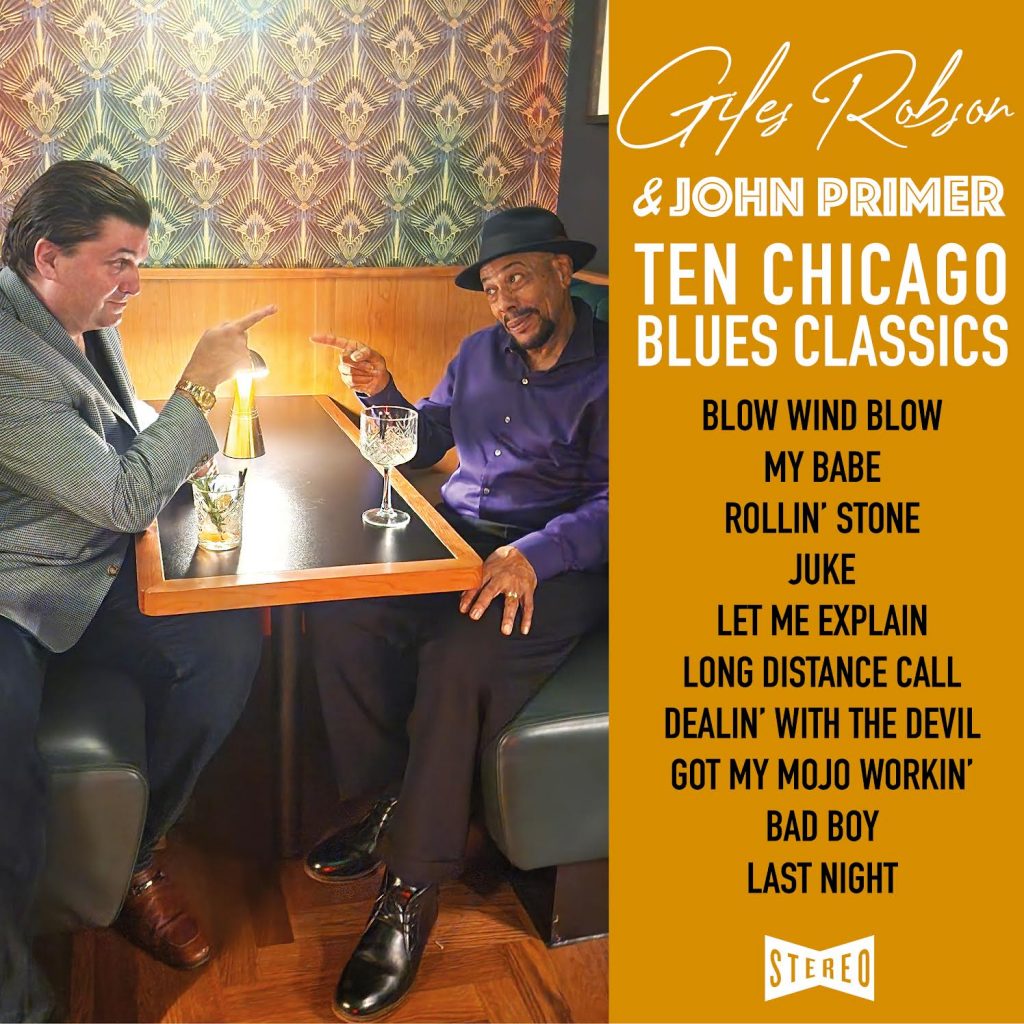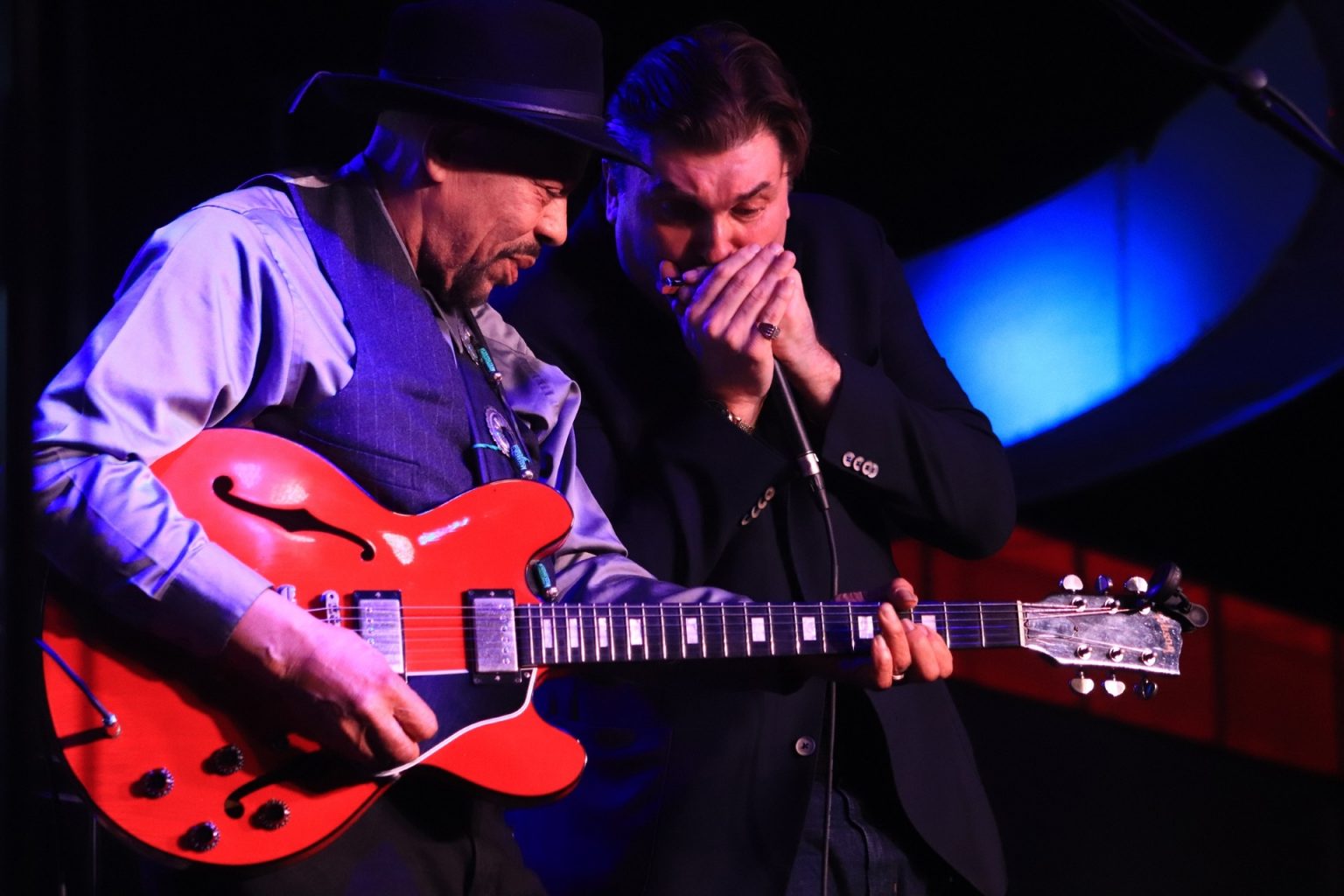Giles Robson has roots in Jersey (UK), won a prestigious Blues Music Award from Memphis, was the first and only European musician signed to Alligator Records, and is steeped in the traditional and electric blues of Chicago. Unsurprisingly, he keeps the best company, performing with American harp legends Billy Branch and Bob Corritore.
Robson has also collaborated with other luminaries, notably Bruce Katz, Joe Louis Walker and, on this latest album, John Primer. John is a multiple Grammy nominee, Blues Music, Blues Blast and Living Blues Award winner and Blues Hall of Fame inductee. In other words, one of the greatest living blues legends and considered the finest keeper of the name of the Chicago blues tradition.
Giles and John shared a stage earlier in 2024:
As Giles explains:
The miracle of these musical forms is that even the most well-known tunes can sound fresh and alive no matter how many times they are re-recorded but only if the approach to each rendition is approached with spontaneity, creativity, and energy with deep respect.
I feel incredibly lucky to have had the opportunity to record with John. It’s been a magical experience; he’s like a one-man orchestra and his rhythmical playing generates an incredible, consistent, transfixing energy from the beginning to the end of each song, which is rare.
The first of four Muddy Waters songs, “Blow Wind Blow” peaked at number 6 in the 1953 US singles charts – the highest since his debut “Country Blues” in 1941 while living in Mississippi. He became a trailblazer of electric Chicago blues and this vibe is evident from the outset, Robson’s laconic vocal style telling the story, interspersed with short bursts of staccato guitar and harp licks. Willie Dixon wrote “My Babe” for Little Walter which became one of the biggest hits in both of their careers. John maintains a steady rolling rhythm enabling Giles to highlight his impressive vocal range and harp versatility.
“Rollin’ Stone” is Muddy Waters’ 1950s interpretation of “Catfish Blues,” dating from the 1920s Mississippi Delta and one of the first songs he learned to play. This imaginative cover is rich in drama and intensity, John and Giles calling and responding intuitively to each other as if joined at the hip, Giles soloing with expression and extending his notes apparently without breathing.
A landmark instrumental, “Juke “ by Little Walter helped shape the distinctive post-war Chicago blues sound, his first chart entry in 1952 a key signing to Chess records. Robson’s wailing harmonica complements Primer’s intricate strings on this pacey, syncopated groove.
The upbeat “Let Me Explain” by Mississippi-born Sonny Boy Williamson ll was released in 1956, three years after he established a strong following in Chicago as a member of Elmore James’ band. Giles is the consummate storyteller interspersing the lyrics with tasteful harp precision and flourish. The slow-burning “Long Distance Call” by Muddy Waters is sung with passion, leaving plenty of room for Giles to add a cornucopia of harmonica interludes.
Sonny Boy Williamson I was born in Tennessee, 1914 and died in Chicago 34 years later having been one of the most recorded blues musicians of that era. “Dealin’ With The Devil” is a classic blues song of a man who has been dealing with the devil and losing the love of his woman. Regarded as one of the first blues harp soloists, Sonny Boy lived, loved, and died the blues. His final words were reportedly, “Lord have mercy” as a result of being attacked and robbed as he returned home from a gig. The impassioned vocals and fluent harp solos are a tour de force.
Well now, I've got the meanest woman
The meanest woman you most ever seen
She sleep with a ice pick in her hand
Man, an' she fights all in her dream
An instrumental version of “Got My Mojo Workin’” by Muddy Waters serves as an exemplar of two blues greats at their seamless best, the rhythmic and percussive duo bending their notes, adding dynamics and having the time of their lives. “Bad Boy” from 1955 was written by Eddie Taylor, the electric blues guitarist who moved to Chicago from Tennessee in 1949. He teamed up with Jimmy Reed, keeping the Delta blues alive until its revival of popularity through the ‘70s and ‘80s. The baton has passed to Giles and the elder statesman who together are taking the music into the next generation while adding their unique interpretations. The third instrumental, Little Walter’s “Last Night,” is a fitting finale from two born to duet, each taking it in turn to showcase their individual talents to the full whilst supporting each other.
This is old school, authentic ‘50s blues at its best with a modern twist: high energy, full of angst, tempered with some joy and, above all, exuding unsurpassed technicality.
Giles Robson has the last word:
The age-old tunes accumulate in the soundtracks of our lives, providing catharsis in the face of heartbreak, adversity and grief. They are ultimately a music of survival based on real life experience. And if the past can tell us anything, the genre is here to stay.

CREDITS:
Recorded At: The Golden Apple Suite, Pomme D’or Hotel, Jersey
Giles Robson: Vocals & Harmonica / John Primer: Guitar
Recorded By: Anquettes Audio Engineering
Post Production & Mastering: Arnaud Fradin, Mojo Hand Studio
Cover Photograph: Jennifer Noble
With Huge Thanks To: Lisa Becker Primer
The release of this record was made possible with a grant from Creative Island Partnership


